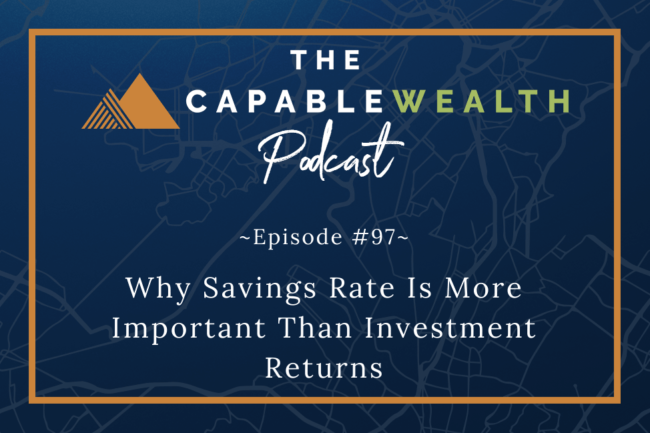Being a Certified Financial Planner, I get a lot of questions about finance. Surprising, I know!
One that comes up often is, “How much should I be putting into my retirement plan?” This can be a 401(k), 403(b), IRA, or a multitude of other retirement plans that are available.
For the majority of people, the conversation is quite similar. Depending on a number of factors, we can figure out the appropriate contribution amount you should be making.
But what if I told you that, for some people, I don’t recommend contributing at all!?
INDUSTRY STANDARDS
The overall finance industry pushes the idea that everyone should be putting 10% of their income into their retirement accounts in order to save for retirement. And if you aren’t doing this, you’ll never be able to retire! (Cue scary music)
For the majority of people, this isn’t bad advice.
But, in reality, this is just like any other blanket statement that doesn’t really make sense for a lot of people. Financial questions like “how much should I put into my retirement accounts?” have so many variables that you simply cannot use a broad brushstroke approach when answering. And if someone barely knows your situation, they are in no position to offer you advice.
You’re probably thinking “That’s nice, Jared, but why shouldn’t I contribute into my retirement plan?”
Let’s hit on some of the pros and cons of retirement plans, and then I’ll hit you with my final points on this…
PROS
1 – Potential tax benefits
Most retirement plans offer some sort of tax incentive toward saving. This is one of the main reasons they’ve become a popular vehicle for retirement saving.
Usually, it’s in some form of tax-deduction, tax-deferment, or tax-exemption.
2 – Employer Matching
It’s very common for employers to offer a match on contributions into a plan. If you put money in, they will also put money in as a “match.”
This is FREE money! And a big positive.
3 – Creditor Protection
Many people don’t realize that there is creditor protection offered by retirement plans.
I hope you don’t find yourself in this position, but if you are ever facing a bankruptcy, assets in your retirement accounts may be offered additional protection against creditors.
4 – Simplicity & Assistance
Most retirement plans offer help with set-up and on-boarding. They should also offer help with selecting the investments inside of the plan. For those with limited knowledge of finance and investing, this can be a big help.
CONS
1 – Loss of Access to Money
Unless you are willing to pay stiff penalties and taxes, you aren’t allowed to access the money in your plan until the stated retirement ages.
2 – Loss of Control
Once the money is inside of the plan, you have limited control and choice over what can be done with the money. Most retirement plans have limited investment options for you to choose from, with the average hovering around just 22 selections. By putting your money into a plan, you are immediately limiting your options for what you can invest in.
3 – Fees
You may not realize it, but you are paying fees in order to participate inside of your 401(k) plan.
Investment fees, plan administration fees, and service fees are among the various fees you’re paying. Studies show estimates for the all-in fees to hover somewhere between 1% – 2.22%.
This can become a huge deterrent in your mission to build wealth.
MY THOUGHTS
For me, the thought process boils down to understanding your personal desire and willingness to build wealth.
If you are truly committed to the process, there are much better ways to build wealth than to sock money into a 401(k) plan each year and hope that your returns outpace your fees by enough to have serious growth.
AREAS TO CONSIDER
If you’re wondering what would be a solid alternative to putting money into an employer-sponsored retirement plan, here are just a few:
- Real Estate
- Opening your own business
- Side hustles
These are just a few areas where many people (myself included!) are making solid money and growing wealth. If you want to read about some other ways, check on my article “How To Create Passive Income and Stop Working.”
SOME INTERESTING POINTS
- It’s often quoted that the average millionaire has 7 streams of income. Whatever the exact number is, it’s more than one. And it certainly isn’t solely reliant on a retirement plan.
- Saving small amounts today isn’t going to make you rich. Or, at least, it won’t for a very long time. In order to build up wealth early enough to truly enjoy it (and not just pass it on to your heirs) you need to invest in areas that will provide you sizable returns.
-
Locking your money up for 40 years just doesn’t sound like an appealing concept to me. I want to live my life today, and plan for tomorrow. Why only plan for tomorrow?
It all goes back to what I’m always telling people – Financial planning decisions are incredibly personal and unique; if you blindly follow all of the standard recommendations you hear in the personal finance industry, you might not be aligning your actions with your own personal goals and desires, and it might not be moving you toward the lifestyle you want.
The problem with all of this is that most people don’t really want to do the work it takes to obtain financial freedom, and they aren’t willing to make the sacrifices that are necessary.
The decision to invest your money outside of a retirement plan is a personal one. You need to ask yourself if you are willing to do what it takes to build wealth, and be honest with your answer. If the answer is yes, I truly believe there are better places to invest.
Capably Yours,
















